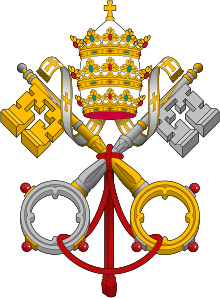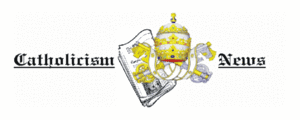
Back بوابة:الكنيسة الرومانية الكاثوليكية Arabic Уикипедия:Светци Bulgarian Portalo:Katolika Eklezio Esperanto Portal:Iglesia católica Spanish Portail:Catholicisme French Portál:Katolicizmus Hungarian Portale:Cattolicesimo Italian Portal:Katolik Malay Portal:Den katolske kirke NB Portal:Katolicyzm Polish
Introduction The Catholic Church, also known as the Roman Catholic Church, is the largest Christian church, with 1.28 to 1.39 billion baptized Catholics worldwide as of 2024. It is among the world's oldest and largest international institutions, and has played a prominent role in the history and development of Western civilization. The church consists of 24 sui iuris churches, including the Latin Church and 23 Eastern Catholic Churches, which comprise almost 3,500 dioceses and eparchies located around the world. The pope, who is the bishop of Rome, is the chief pastor of the church. The Diocese of Rome, known as the Holy See, is the central governing authority of the church. The administrative body of the Holy See, the Roman Curia, has its principal offices in Vatican City, a small independent city-state and enclave within the Italian capital city of Rome, of which the pope is head of state. The core beliefs of Catholicism are found in the Nicene Creed. The Catholic Church teaches that it is the one, holy, catholic and apostolic church founded by Jesus Christ in his Great Commission, that its bishops are the successors of Christ's apostles, and that the pope is the successor to Saint Peter, upon whom primacy was conferred by Jesus Christ. It maintains that it practises the original Christian faith taught by the apostles, preserving the faith infallibly through scripture and sacred tradition as authentically interpreted through the magisterium of the church. The Roman Rite and others of the Latin Church, the Eastern Catholic liturgies, and institutes such as mendicant orders, enclosed monastic orders and third orders reflect a variety of theological and spiritual emphases in the church. Of its seven sacraments, the Eucharist is the principal one, celebrated liturgically in the Mass. The church teaches that through consecration by a priest, the sacrificial bread and wine become the body and blood of Christ. The Virgin Mary is venerated as the Perpetual Virgin, Mother of God, and Queen of Heaven; she is honoured in dogmas and devotions. Catholic social teaching emphasizes voluntary support for the sick, the poor, and the afflicted through the corporal and spiritual works of mercy. The Catholic Church operates tens of thousands of Catholic schools, universities and colleges, hospitals, and orphanages around the world, and is the largest non-government provider of education and health care in the world. Among its other social services are numerous charitable and humanitarian organizations. (Full article...) Selected article
 Opus Dei, formally known as The Prelature of the Holy Cross and Opus Dei, is an organization of the Catholic Church that teaches the Catholic belief that everyone is called to holiness and that ordinary life is a path to sanctity. The majority of its membership are lay people, with secular priests under the governance of a prelate appointed by the Pope. Founded in Spain in 1928 by the Roman Catholic priest Josemaría Escrivá, Opus Dei was given final approval in 1950 by Pope Pius XII. In 1982, the Catholic Church made it into a personal prelature — its bishop's jurisdiction covers the persons in Opus Dei, wherever they are. The Prelature of Opus Dei has about 87,000 members in more than 80 different countries. About 70% of Opus Dei members live in their private homes, leading traditional Catholic family lives with secular careers, while the other 30% are celibate, of whom the majority live in Opus Dei centers. Opus Dei organizes training in Catholic spirituality applied to daily life. Aside from personal charity and social work, Opus Dei members are involved in running universities, university residences, schools, publishing houses, and technical and agricultural training centers.
Selected image
 Credit: Chowells Liverpool Metropolitan Cathedral of Christ the King (usually shortened to Liverpool Metropolitan Cathedral) is a Roman Catholic cathedral in Liverpool, England. It replaced the Pro-Cathedral of St. Nicholas, Copperas Hill. The cathedral is the seat of the Archbishop of Liverpool, the mother church of Liverpool's Catholics, and the metropolitan church of the ecclesiastical Northern Province. Selected biography
Did you know...

Related portalsFeast Day of July 3
Selected quote

News
SubcategoriesTopics
The Holy Bible:
Particular Churches (grouped by liturgical rite):
Things you can do
External resourcesWikiProjectsAssociated WikimediaThe following Wikimedia Foundation sister projects provide more on this subject:
Discover Wikipedia using portals |
© MMXXIII Rich X Search. We shall prevail. All rights reserved. Rich X Search
































